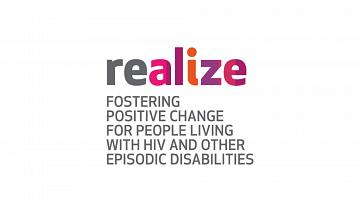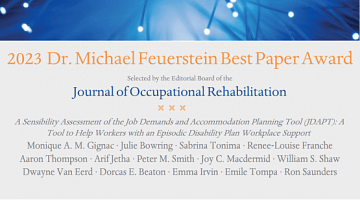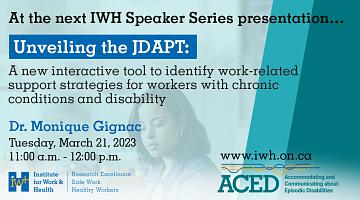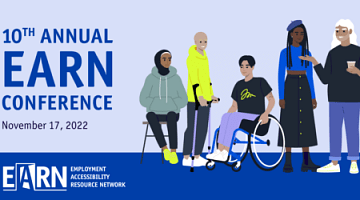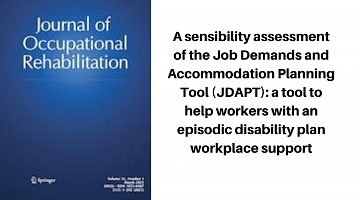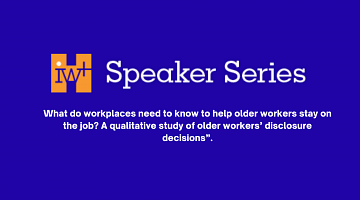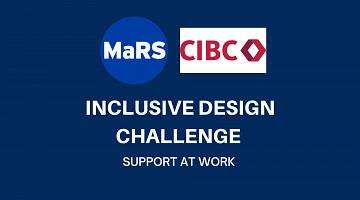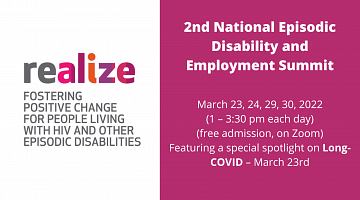New study seeks workplace parties who provide support to workers
Do you provide workplace support to workers with chronic health conditions?
A new ACED study is looking to interview people with experience supporting workers to learn more about how changes in Canadian workplaces have affected support for workers with chronic health conditions.
Over the past several years, a great deal has changed in Canadian workplaces – COVID-19 and hybrid work, a greater emphasis on EDI and psychosocial work environments, cannabis legalization and substance use issues. Researchers at the Institute for Work & Health are interested in understanding how these changes may have affected how organizations provide support to their workers with chronic… Read more. Learn more
Registration is now open for the 2025 Annual National Summit on Episodic Disability and Employment
ACED partner Realize will be hosting their 5th Annual National Summit on Episodic Disability and Employment on on March 19 and 20, 2025. The theme for the 2024 summit is Disclosure in Dialogue, and ACED Project Director Dr. Monique Gignac will be speaking about her research on disability disclosure in the workplace and our new communication decision-support tool, DCIDE.
The National Summit on Episodic Disability and Employment is a free, virtual summit that provides a unique opportunity for business leaders, managers, human resources professionals, people… Read more. Learn more and register here
Co-workers matter: new ACED study looking for participants
Do you have a co-worker with a chronic health condition who has shared some of their health and work challenges with you? Or are you a person with a chronic physical or mental health condition who has shared some information with a co-worker about your challenges?
We are conducting a research study to learn more about sharing personal health information at work. We would like to speak to people who are working with a chronic condition that can sometimes impact their job to learn more about the sharing of personal health information with colleagues.
We would also like to speak with workers who do not live with a health condition themselves, but who have a colleague with a… Read more. Learn more about the study
New communication decision support tool - DCIDE - is now live
DCIDE (Decision-Support for Communicating about Invisible Disabilities that are Episodic) is a free tool that aims to help workers consider whether or not to share some personal health information with others at work.
People living with episodic health conditions often grapple with the complex decision of whether or not to tell their employer about their disability. For most people, it means thinking about not just their health and any difficulties they may be having at work, but also their goals, their personal preferences - and what their workplace is like when it comes to supporting workers with personal needs.
There isn't one right answer, and only the person living… Read more. Access the tool
ACED launches new tool at IWH Speaker Series
ACED will be formally launching a new tool, DCIDE (Decision-Support for Communicating about Invisible Disabilities that are Episodic), on November 19, 2024.
DCIDE is a free online tool that aims to help workers consider whether or not to share some personal health information with others at work.
In this free webinar, ACED project director Dr. Monique Gignac will present recent research on how workers prioritize different issues when thinking about disclosure of health information at work. There will be a demonstration of the DCIDE tool during this presentation.
Best paper award for JDAPT feasibility study
A recent publication by the ACED team evaluating the feasibility of the Job Demands and Accommodation Planning Tool (JDAPT) has received the 2023 Michael Feuerstein Award for the best paper in the Journal of Occupational Rehabilitation.
"This study was our first to evaluate the JDAPT after it was developed," says Dr. Monique Gignac, lead author of the paper and ACED project director. "We were excited to find that workers with different types of health conditions and jobs, as well as those providing support within organizations like supervisors, human resource professionals, and disability managers, found the JDAPT helpful."
As noted by the editor-in-chief of the journal,… Read more. Access the JDAPT Read the study
Multiple Sclerosis (MS) and the COVID-19 Gap: Report available now
A new report “The socioeconomic cost of, and impact of COVID-19 on, multiple sclerosis in Canada” estimates substantial costs of MS to Canada.. The report estimates that, in a typical (non-disrupted) year, MS costs Canada $3.4 billion in direct health expenditure, productivity loss and other costs. The independent report, authored by Deloitte Access Economics, also found nearly $600 million in additional social, economic and health costs resulting from the COVID-19 pandemic through a combination of delayed MS diagnosis, and delayed or foregone MS treatment.
ACED partner MS Canada is mobilizing their MS community to write… Read more. Learn more here
Worker and Organizational versions of the Job Demands and Accommodation Planning Tool (JDAPT) are now available in both English and French
The Job Demands and Accommodation Planning Tool officially launched aworker version in English (JDAPT for workers) and French (L’OPA-ET destiné aux travailleurs et travailleuses) in March 2023. The JDAPT for workers was designed for workers with chronic conditions to learn about potential supports and accommodations specific to any challenges related to their job demands. A 9-month evaluation study is being concluded to evaluate the usefulness of the tool.
Recently, organizational versions of the JDAPT became available for those who support workers experiencing episodic conditions in their workplace. The JDAPT for organizations includes two tools:
- JDAPT to Support… Read more.
ACED officially launches the Job Demands and Accommodation Planning Tool (JDAPT) on March 21, 2023
ACED project director Dr. Monique Gignac will unveil the Job Demands and Accommodation Planning Tool (JDAPT) on March 21, 2023, at an IWH Speaker Series webinar. In this presentation, Dr. Gignac will describe the tool, its development, as well as present data from two studies on the tool. The worker version of the JDAPT is ready to use and has been designed for workers with chronic conditions to learn about potential supports and accommodations specific to their job demands. These range from strategies workers can implement on their own, to accommodations they may need to request more formally. By keeping the focus on… Read more.
Dr. Monique Gignac to present at the 10th Annual EARN Conference on November 17, 2022
Employment Accessibility Resource Network (EARN) will be hosting their 10th Annual Conference taking place virtually on November 17th from 9 AM-12 PM EST. The theme of the conference this year is “Long-COVID and Episodic Disability: Insights, Impacts and Inclusion at Work.”
Dr. Monique Gignac, Director of the Accommodating and Communicating about Episodic Disabilities (ACED) Project will be a guest speaker at the conference.
Please… Read more.
Journal article published on initial assessment of the JDAPT- a tool to help workers with an episodic disability plan workplace support
The findings from an ACED study that examined the sensibility of the job demands and accommodation planning tool (JDAPT), was recently published in the Journal of Occupational Rehabilitation. The JDAPT was rated highly relevant and useful, although not always easy to complete for someone with an episodic condition. This study highlights the need for tools that facilitate accommodations for workers with episodic disabilities and provides early evidence for the sensibility of the JDAPT.
To learn more, click here.
ACED Project Director, Dr. Monique Gignac to present at the Rethinking Disability Conference 2022
The Accommodating and Communicating about Episodic Disabilities (ACED) Project Director, Dr. Monique Gignac will present at the Rethinking Disability Conference hosted by the Ontario Disability Employment Network (ODEN). This year, the conference will focus on the future of work and will be held from November 14-16th, 2022.
Please click here for the slides from this presentation.
ACED project director to present at the IWH Speaker Series on September 20, 2022
Dr. Monique Gignac will be presenting at an upcoming webinar on the topic of what workplaces need to know to help older workers stay on the job. She will highlight her findings from a qualitative study done on older workers’ disclosure decisions. This IWH Speaker Series webinar will take place on Tuesday, September 20, 2022 at 11 am EST.
ACED team wins inclusive design competition for the Job Demands and Accommodation Planning Tool (JDAPT)
The ACED (Accommodating and Communicating about Episodic Disabilities) project team has taken the top prize in a competition called Inclusive Design Challenge: Support at Work. The competition, the second of the MaRS Innovation Challenges series and co-sponsored by CIBC, is aimed at finding solutions that improve support at work for persons with disabilities. The team won the competition for its Job Demands and Accommodation Planning Tool (JDAPT). The tool is designed to… Read more.
Newly formed Expert Advisory Committee to support ACED project
A new committee, the ACED Expert Advisory Committee (EAC), has been created with five individuals who live with a chronic episodic condition. These individuals, who represent diverse backgrounds and a wide range of lived experiences, also have personal experience with employment, workplace support and accommodations, and decisions related to disclosure of personal health information. The purpose of the ACED EAC is to support the work of the ACED project by providing advice on how to enhance the relevance and ease-of-use of newly created ACED tools; identify key issues that are not being adequately addressed in workplace supports; and help identify the best ways to reach potential users… Read more.
2022 Virtual National Summit on Episodic Disabilities and Employment
Realize, one our ACED Partners is hosting their 2nd Annual Virtual National Summit on Episodic Disability and Employment on March 23, 24, 29 and 30, 2022. Registration for the summit is free and the entire event will be presented online using the Zoom platform.
Dr. Monique Gignac, the ACED project director will be presenting on March 24th and 29th.
Register for the summit here!
Help us evaluate the Job Demands and Accommodation Planning Tool (JDAPT)
The ACED team members are looking to evaluate the Job Demands and Accommodation Planning Tool (JDAPT). We are looking for workers in Canada living with a chronic health condition to take part in this research.
People’s reasons for disclosing episodic disabilities linked to support they receive
Should people with an episodic disability disclose their condition at work? It's a complex decision. This study led by ACED director Dr. Monique Gignac looks at people's reasons for disclosing (or not) and explores whether they are linked to outcomes.
Understanding the employment experiences of people with inflammatory bowel disease (IBD): a work in progress
Leslie Cheng speaks about her practicum work with ACED partner Crohn's and Colitis Canada on how people with IBD experience "work". The key takeaways were: challenges in the workplace are common and we don’t know enough about them; a one-size-fits-all approach to workplace accommodations does not work; co-workers and supervisors can be important sources of support; and food can impact social interactions in the workplace.
Making the future of work more inclusive for young adults with disabilities
The world of work is changing very quickly. Factors like technology, artificial intelligence and climate change are changing how we work and creating new challenges and opportunities for young people seeking jobs who are living with a disability.
Your help is needed to understand how young people with disabilities can be supported in the future of work.
Our colleagues at the Institute for Work & Health are looking for young people with lived experience with disability (18-35) and key informants (e.g., policymakers, disability employment service providers, employers, and labour market experts) to help design future of work supports for young people… Read more. Join here
ACED director's update: accommodation planning tool coming soon, work starting on disclosure tool
We hope you are keeping safe and healthy as the COVID-19 pandemic continues. The pandemic has highlighted many challenges, including the importance of keeping workers safe and supported. As part of the ACED study, partners and study participants have continued to lend their time to test and provide feedback on ACED tools and resources. Our interactions have highlighted the vulnerabilities of people living and working with a chronic episodic condition during COVID-19. As the ACED research and toolkit development continues, we are keeping these issues top of mind.
In… Read more.
Resources supporting workers with chronic episodic disabilities – where could we do better?
A scan of workplace resources focused on supporting working people with episodic disabilities was recently published. The scan found that interactive resources are largely missing, and filling this gap could lead to more customizable tools that meet individual worker’s and workplace needs. The resource scan was undertaken by an ACED co-investigator, IWH Scientist Dr. Dwayne Van Eerd.
ACED practicum students enrich health partners’ work-related research and outreach
Two master’s students brought their passion for disability justice and health equity to their ACED practicums in 2020. Leslie Cheng (left) worked with Crohn’s and Colitis Canada to study the relationship between inflammatory bowel disease and work. Ayesha Khan (right) worked with Realize Canada to study the communication and disclosure of episodic disabilities during the hiring process.
Leslie Cheng had a unique opportunity to work directly with one of the ACED partners, Crohn’s and Colitis Canada. Leslie’s interest in working on ACED was sparked by her passion for disability justice and health equity.… Read more.
Policy paper: Disclosure and working towards barrier-free recruitment
ACED partner Realize Canada recently published a policy paper on issues of equity in the hiring process, with the support of ACED practicum student Ayesha Khan. The paper, titled “Should I tell them? Working towards barrier-free recruitment in the Canadian labour market,” describes issues around disclosure and how they may affect the hiring process for people with episodic disabilities. The policy paper also contains several policy recommendations.
Get the policy paper (PDF, 1MB)Partner tool helps young adults with Rheumatic Disease navigate the world of work
An ACED co-investigator, IWH Scientist Dr. Arif Jetha, led the design of a new interactive tool for youth and young adults with rheumatic health conditions such as juvenile arthritis or lupus as they begin their working lives. The tool is designed to help them identify and address the unique challenges they may face when looking for work, already working or unable to work due to their health condition.
Episodic health conditions challenge workplace disability management systems
Employers are recognizing that they need a new model of disability management to support workers with episodic health conditions, according to a new Institute for Work & Health study. Because episodic health conditions are often characterized unpredictable periods of illness and disability, they can raise a host of issues for workplaces—including issues related to privacy, stigma and trust. Dr. Monique Gignac explains more about our findings in an interview published in At Work.
Read the At Work articleWorkplace perspectives on challenges accommodating mental and physical health conditions
Results from our ACED research into organizational perspectives on communicating about and accommodating episodic disabilities in the workplace has been published in the Journal of Occupational Rehabilitation. Drawing on in-depth interviews with a diverse group of workplace stakeholders—including supervisors, disability managers, union representatives, occupational health representatives and labour lawyers—this research points to areas where workplace disability support processes could be enhanced to improve the sustainability of employment among workers living with episodic disabilities.
Get the journal articleMessage from ACED partnership about episodic disabilities and work during COVID-19
The COVID-19 pandemic has raised new concerns for people who are working with chronic episodic disabilities and may be more vulnerable to ill health than others during epidemics. An estimated 27 per cent of the working population has a chronic episodic disability. Yet, due to their intermittent, fluctuating and sometimes invisible nature, many episodic conditions go unnoticed in the workplace. For a multitude of reasons, people with episodic conditions often do not disclose their condition to their employers or co-workers.
It is important for workplace parties to understand that people with episodic disabilities may be at greater risk if they are exposed to co-workers or the… Read more.
People at greatest risk during COVID-19 can benefit most from supportive workplaces
In the planning of health and safety responses to COVID-19 and the ultimate reopening of workplaces, employers should be aware of the unique needs of workers with underlying health conditions. Dr. Arif Jetha, a member of the ACED research team, addresses this issue in the most recent edition of At Work.
Read more on the IWH websiteACED partners offer COVID-19 resources
ACED has compiled a listing of partner organization's COVID-19-related resources aimed at informing and offering guidance to individuals with episodic conditions, as well as those who support them.
Go to the resource pageTwo new tools available on managing arthritis and work
Not everyone with an episodic disability like arthritis needs support at work, but getting the right support can make a difference to work satisfaction and productivity. The Arthritis Society recently added two new tools—developed in collaboration with the ACED partnership—to its collection of resources on managing arthritis and work. The tools are designed to help people consider whether to disclose a condition at work and to plan a conversation about workplace needs as they relate to arthritis.
Go to the ACED partner toolsACED PhD student awarded three-year graduate scholarship
Gemma Woticky, a research assistant with the ACED project, has received a three-year Frederick Banting and Charles Best Canada Graduate Scholarship from the Canadian Institutes of Health Research to continue her studies. Woticky is a doctoral student in the Social and Behavioural Health Sciences Division at the University of Toronto’s Dalla Lana School of Public Health. Under the supervision of ACED’s project lead, Dr. Monique Gignac, Woticky is studying the lived experiences of employees with a disability and their co-workers to understand communication and behavioural strategies, as well as workplace cultures, related to disability support and accommodation at work.
Learn more about the ACED project teamACED seeking supervisors or managers to test new tool
Do you supervise an employee receiving or needing support for an episodic disability or health condition? If so, we want your input on a new tool being developed by ACED called the Job Demands and Accommodation Planning Tool (JDAPT). The JDAPT is designed to foster discussion and problem-solving between employees and their managers in order to meet employee needs for workplace supports. Your input will help make this tool practical and useful so that more workplaces can support employees with intermittent, chronic health conditions. We are testing the tool now until the end of April 2020.
Find out how to get involvedNew Statscan report focuses on episodic disabilities
Using data from the 2017 Canadian Survey on Disability, Statistics Canada has taken a close look at the demographic, employment and workplace accommodation profiles of people with episodic disabilities in a report called The Dynamics of Disability: Progressive, Recurrent or Fluctuating Limitations. In the report, released in December 2019, Statscan compares relatively stable disabilities that result in consistent and unchanging limitations with three categories of episodic disabilities: those with progressive, recurrent or fluctuating limitations. It refers to the concept of different types of changing limitations as "disability dynamics."
The main findings of the… Read more.
ACED members' expertise informs federal report on episodic disabilities
ACED project director Dr. Monique Gignac of the Institute for Work & Health, as well as ACED partner members Julie Kelndorfer of MS Society of Canada and Tammy Yates of Realize, were among those who provided expert testimony in late 2018 to the House of Commons Standing Committee on Human Resources, Skills and Social Development and the Status of Persons with Disabilities (HUMA) as part of HUMA's exploration of the needs of people with episodic disabilities. Based on their and others' testimony, the standing committee made 11 recommendations in a March 2019 report entitled Taking Action: Improving the Lives of Canadians Living with Episodic Disabilities.
This… Read more.
ACED partner video offers advice for workers with arthritis
Feeling tired, stiff or achy after work is something many of us have experienced. But having arthritis can make these symptoms part of everyday living – during work and after. By speaking to individuals with arthritis, researchers have learned about what helps them to manage their symptoms inside and outside the workplace. Dr. Arif Jetha, a scientist at the Institute for Work & Health and a member of the ACED research team, shares these approaches in a new video from the Arthritis Society.
Watch the videoACED handout useful for sharing project information
The ACED project team has created a downloadable handout that makes it easy to share information about the project with others. Called "The ACED primer," the one-page, double-sided handout explains what the partnership is all about by asking and answering seven questions, from why the ACED project is needed to the people, organizations and funders behind it.
Get the handout

